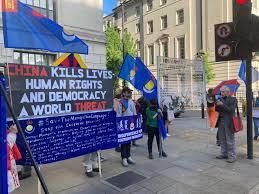

Southern Mongolia, a region rich in cultural heritage and natural beauty, finds itself grappling with myriad challenges under Chinese governance. The impact of Chinese policies extends deeply into the daily lives of the Mongolian people, jeopardizing their language, traditions, and identity. As globalization sweeps across the region, the push for assimilation has led to significant cultural erosion, raising concerns about the preservation of Mongolian heritage. In this blog post, we will explore the ongoing challenges faced by the people of Southern Mongolia, shedding light on the complexities of their struggles and resilience.
Economic hardships compound the difficulties experienced by the Southern Mongolian population. Strict regulations and limited access to resources often stand in the way of prosperity, forcing many to navigate a precarious existence. Despite these struggles, the spirit of resistance among the Southern Mongolian people shines brightly, as they continue to advocate for their rights and recognition. This post delves into the intricate dynamics of cultural suppression, economic adversity, and the relentless fight for dignity, offering readers a comprehensive understanding of the ongoing struggles faced by this resilient community.
The impact of Chinese policies on Southern Mongolia's cultural heritage
Southern Mongolia, rich in cultural diversity and historical significance, endures the ramifications of restrictive Chinese policies that threaten its unique identity. Authorities systematically promote the use of Mandarin in schools and public life, undermining the Mongolian language's status. This language shift not only jeopardizes communication within communities but also diminishes the transmission of cultural narratives vital for future generations. Traditional Mongolian customs, arts, and practices face similar challenges as modernization efforts prioritize uniformity over diversity, erasing the distinct characteristics that define Southern Mongolian culture.
In addition to linguistic erosion, Southern Mongolians grapple with the forced assimilation policies that prioritize Chinese culture and ideology. Cultural expressions, including traditional festivals, music, and art forms, receive minimal support from the government, leading to their gradual decline. These policies aim to create a singular national identity at the expense of regional uniqueness, prompting Southern Mongolians to confront an existential crisis. As communities rally to preserve their cultural practices despite these suppressive measures, the struggle against cultural homogenization highlights the resilience of the Southern Mongolian spirit.
Economic hardships: Navigating life under Chinese governance
Southern Mongolia faces significant economic challenges as the region grapples with the realities of Chinese governance. The heavy-handed policies imposed by the Chinese government have disrupted traditional livelihoods, where herding and agriculture once thrived. Instead of supporting local economies, the focus on industrial development and resource extraction often sidelines the needs of the indigenous population. Many herders find their grazing lands encroached upon by mining operations, leading to a loss of income and forcing them to abandon their way of life. This shift not only creates financial instability but also erodes the deep cultural ties that Mongolians have with their land.
Moreover, inflation and high living costs further exacerbate the struggles in Southern Mongolia. As the Chinese government prioritizes urban development, rural areas frequently suffer from neglect. Access to essential services, including healthcare and education, becomes increasingly limited, leaving many communities to fend for themselves. The systematic disregard of local needs fosters profound economic despair among the population. Despite these adversities, the resilience of the people of Southern Mongolia shines through as they find innovative ways to adapt and survive, continuing to fight for economic opportunities and a sustainable future in their homeland.
Resistance and resilience: The fight for rights and recognition in Southern Mongolia
The people of Southern Mongolia have shown remarkable resilience in the face of oppressive policies imposed by the Chinese government. Grassroots movements have emerged, fueled by a deep desire to preserve their cultural identity and protect their land from encroachment. Activists and ordinary citizens alike participate in various forms of protest, ranging from peaceful demonstrations to online campaigns that raise awareness about the challenges faced by their communities. Through these efforts, they aspire to assert their rights and foster a sense of unity among those who share a commitment to Southern Mongolia's cultural heritage.
Despite facing significant risks, including harsh reprisals from authorities, many Southern Mongolians refuse to remain voiceless. They continue to engage in advocacy, seeking international support to amplify their concerns on platforms like social media and human rights forums. Organizations and coalitions are forming to draw attention to the plight of Mongolian pastoralists, highlighting issues such as land appropriation and environmental degradation. This persistent struggle for recognition underscores the determination of the Southern Mongolian people to reclaim their rights and navigate their path toward greater autonomy and dignity under Chinese governance.